Who Has the Responsibility of Meeting the People’s Needs?

Countrymen, the long experience of our late miseries, I hope is sufficient to persuade everyone to a present correction of himself, and think not that either my pains, nor the Adventurers’ purses, will ever maintain you in idleness and sloth. I speak not this to you all, for diverse of you I know deserve both honor and reward, better than is yet here to be had; but the greater part must be more industrious, or starve.…Therefore he that offendeth, let him assuredly expect his due punishment.
— Captain John Smith of Jamestown, implementing a hard and fast rule for every worker in the colony soon after he took charge in 1608. Anyone not working would not be allowed to eat. This was the same principle of which the apostle Paul reminded the Thessalonian Christians in 2 Thessalonians 3:10, and a principle that, when implemented in Jamestown, brought the colony back from the brink of starvation.

The failure of this experiment of communal service, which was tried for several years, and by good and honest men proves the emptiness of the theory…that the taking away of private property, and the possession of it in community, by a commonwealth, would make a state happy and flourishing; as if they were wiser than God. For in this instance, community of property (so far as it went) was found to breed much confusion and discontent, and retard much employment which would have been to the general benefit and comfort.
—William Bradford, Governor of the Plymouth Colony, explaining why the Pilgrims ditched socialism after two years and replaced it with a model that upheld private property rights. As happened with the changes implemented in Jamestown, this decision on the part of the Pilgrims saved Plymouth from extinction.
Key point: The marriage of Responsibility and Inherent Rights has produced children named Liberty, Prosperity, Compassion, and Charity. All these are members of the same family.
All of the articles in this series are accessible from this page.
We’re exploring twelve Bible passages that destroy socialism and uphold free market principles. Many verses in the Bible do that — far more than twelve; and even though advocating economic freedom isn’t the Bible’s main theme or primary message, only someone who is foolish, ignorant, a crowd pleaser, a coward, or a combination of two or more of these would ignore what the Scriptures say about economic systems merely because that topic isn’t a “spiritual” one (and might even be considered “political”). Too many Christians and Christian leaders today fail to understand the Bible tells us, not only how to prepare for the next life, but also how to live this one, both individually and corporately.
Even though advocating economic freedom isn’t the Bible’s main theme or primary message, only someone who is foolish, ignorant, a crowd pleaser, a coward, or a combination of two or more of these would ignore what the Scriptures say about economic systems merely because that topic isn’t a “spiritual” one, and might even be considered “political.”
Last time we cited the Eighth and Tenth of the Ten Commandments to emphasize that private property rights are inherent, God-given rights just as are other rights reflected in the Decalogue. We now move forward to examine additional Bible verses that are friends of free enterprise and enemies of socialism. Keep your eyes and mind open! You are likely to see principles in Scripture you’ve never seen before!
The Biblical Work Ethic and Free Enterprise: Able and Productive Partners
Third, the Fourth of the Ten Commandments affirms the value of work — with the clear implication the work commanded is to be performed primarily to accumulate wealth and resources to meet the needs of oneself and one’s family. Exodus 20:8-11 states,
8 “Remember the Sabbath day, to keep it holy. 9 Six days you shall labor and do all your work, 10 but the seventh day is the Sabbath of the LORD your God. In it you shall do no work: you, nor your son, nor your daughter, nor your male servant, nor your female servant, nor your cattle, nor your stranger who is within your gates. 11 For in six days the LORD made the heavens and the earth, the sea, and all that is in them, and rested the seventh day. Therefore the LORD blessed the Sabbath day and hallowed it.

Wait a minute! someone may object. How do we know the work commanded in Exodus 20:9 is work first and foremost to improve the lot of self and family? Because of all the other things the Bible teaches about work, wealth, accumulation and stewardship of wealth, and private property.
Note as well that the Commandment is specifically directed to everyone in or in some way connected to the family unit. Who is prohibited from working on the Sabbath? On that special day “you shall do no work: you, nor your son, nor your daughter, nor your male servant, nor your female servant, nor your cattle, nor your stranger who is within your gates.”
In part 1 we saw that the Eighth and Tenth Commandments uphold private property rights and that property rights were among several God-given rights set forth in all of the Ten Commandments. Pay close attention to the remaining verses we cite in this series, especially the next two, which come from the New Testament.
Fourth and fifth, we can confidently point to 2 Thessalonians 3:10 and 1 Timothy 5:8 as evidence that, according to Scripture, compensation for work is to benefit the worker and his or her family.
In 2 Thessalonians 3:10, the apostle reminded the Thessalonian believers of a principle he held when he was in their company: “For even when we were with you, we commanded you this: If anyone will not work, neither shall he eat.”
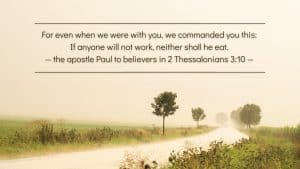
In 1 Timothy 5:8, Paul wrote to Timothy, “[I]f anyone does not provide for his own, and especially for those of his household, he has denied the faith and is worse than an unbeliever.”

Who is responsible for meeting the needs of a nation’s people? Each person is responsible — not the government. And beyond the reasonable expectation that each individual will work to meet his or her own basic needs, family members are responsible. These are biblical teachings.
Who, then, is responsible for meeting the most basic needs one has? Each person is responsible — not the government. And beyond the reasonable expectation that each individual will work to meet his or her own basic needs, family members are responsible. These are biblical teachings. Contrary to the emotional rhetoric of many evangelical social justice crusaders today, redistribution of wealth by the government is not a biblical idea. We will see this with increasing clarity as this series continues to unfold.
The Key to Really Helping the Poor
Note that Paul advocated denying food to those who would not work, not those who could not. I am not arguing here against a government “safety net” for those who are unable to work and whose families, for valid reasons, can’t meet their needs. I am arguing against government handouts that discourage work among the able-bodied and that thereby encourage slothfulness.
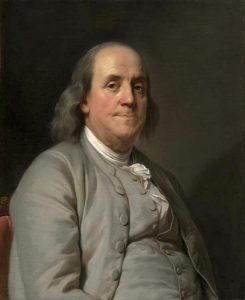
Founding Father Benjamin Franklin (1706-1790) had tremendous insights about the best ways to help the poor.
I am for doing good to the poor, but I differ in opinion of the means. I think the best way of doing good to the poor, is not making them easy in poverty, but leading or driving them out of it. In my youth I traveled much, and I observed in different countries, that the more public provisions were made for the poor, the less they provided for themselves, and of course became poorer. And, on the contrary, the less was done for them, the more they did for themselves, and became richer.
Let me reiterate. Personal responsibility isn’t just about individuals; it’s also about families. If the members of someone’s family lack food, clothing, and other necessities, that individual is responsible to work to meet the needs of his or her family members, if he or she is able to do so. This is especially true of husbands and fathers, whom God has appointed as providers for their wives and children (see Genesis 2:15; 3:1-16). Parents also should be cared for as they continue to age and their physical needs increase.

Declaring War on the Rich Doesn’t Help the Poor
Although I don’t remember from whom I heard it, I have never forgotten this important point: Declaring war on the rich doesn’t help the poor — but it may make certain people feel good.
Here’s how the point was made:
Ask yourself this question —
If the needs of the poor could be met without taking away resources from the rich, would I support such an approach, or would I instead insist on one that demanded that the rich surrender their resources to help the poor?
Mark it down. If an individual won’t readily support an approach that helps the poor without penalizing the rich, he or she clearly is more concerned about hurting the rich than helping the poor.
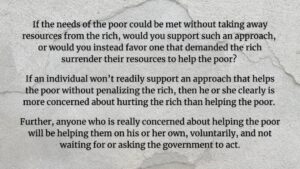
There’s more! Anyone who is genuinely concerned about helping the poor will already be doing so voluntarily, on his or her own — without waiting for or asking the government to step in and redistribute wealth and other resources.
Government’s Divinely-Written Job Description
We can be thankful that our nation’s Founding Fathers understood the proper role of government. At the conclusion of part 1 we said,
[R]ecognition of [God-given] rights [which are] rooted in the Ten Commandments are essential to ordered liberty. Government has a duty to recognize and protect inherent rights. It does so by fulfilling its God-given task of maintaining order (see 1 Tim. 2:1-4) by commending those who do right and punishing those who do wrong (see Rom. 13:1-7; 1 Pet. 2:13-17). The right and wrong in these passages are those things that are “good” and “evil,” respectively, according to God’s standard of righteousness.
Pay close attention; these next statements are critically important: If a nation wants its responsible citizens to remain responsible, it will protect the property rights that belong to them just because they are human beings whom God created in His image. The surest way to thwart prosperity is to punish those who succeed.
If a nation wants its responsible citizens to remain responsible, it will protect the property rights that belong to them just because they are human beings whom God created in His image. The surest way to thwart prosperity is to punish those who succeed.
The successes of prosperous people benefit, not only them, but others as well; not only because successful people need employees, but also because they offer goods and services that others want and for which they are willing to pay. During his Inauguaral Address of 1801, Thomas Jefferson (1743-1826), America’s third president, wisely observed that
a wise and and frugal government, which shall restrain men from injuring one another, shall leave them otherwise free to regulate their own pursuits of industry and improvement, and shall not take from the mouth of labor the bread it has earned. This is the sum of good government….
John Adams (1735-1826), you will remember, was America’s second president. He said this: “The moment the idea is admitted into society that property is not as sacred as the law of God, and that there is not a force of law and public justice to protect it, anarchy and tyranny commence.”
Adams also declared, “We hold that each man is the best judge of his own interest,” and “Government is instituted for the common good; for the protection, safety, prosperity, and happiness of the people; and not for profit, honor, or private interest of any one man, family, or class of men….”
Jefferson and Adams were not alone in their thinking. To their credit and to the benefit of millions of Americans who would arrive on the scene in subsequent generations, America’s Founding Fathers knew government wasn’t responsible to help the poor; instead, its own citizens were.
Genuine Compassion Often Is Mistaken for Callousness
Don’t for a New York minute think the Founding Fathers and early leaders of America weren’t compassionate. Indeed, they were! Yet they did not allow charitable deeds or public policy decisions to be driven by emotions alone. True compassion often doesn’t appear to be what it really is — and in our emotionally driven society, many times that which looks and feels compassionate actually is, in the long run, destructive.
Do what does good, not what merely feels good.
—Dennis Prager—
I believe Dennis Prager would say that America’s Founders rightly evaluated their actions and decisions, not by what made them feel good, but by what actually would accomplish good. Furthermore, they understood that good government is charged with certain responsibilities and not charged with others. Charity is to be voluntary; it is a job for individuals and organizations acting on their own.
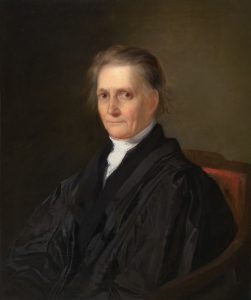
I know I don’t have to tell you that George Washington (1732-1799) served as America’s first president, but you may not know that in a letter to his nephew, Bushrod Washington, he wisely advised,
Let your heart feel for the afflictions and distresses of every one, and let your hand give in proportion to your purse; remembering always the estimation of the widow’s mite, but, that it is not every one who asketh, that deserveth charity; all, however, are worthy of the inquiry, or the deserving may suffer.
James Madison (1751-1836) was our nation’s fourth president; he succeeded Thomas Jefferson in that office. Madison wrote, “Charity is no part of the legislative duty of the government. Yet he also declared, “It is the mutual duty of all to practice Christian forbearance, love, and charity toward each other.”
If it sounds to you as though the Founding Fathers grasped much of what we’ve been discussing here, then you understand more than most about America’s Christian heritage. Of course, the first four US presidents and the other men who founded the United States were not perfect. Even so, they got a great deal right.
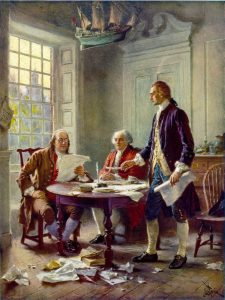
Not all were Christians, but for the most part, they held a biblical worldview. We remain direct beneficiaries of their beliefs, convictions, courage, decisions, and actions. Make no mistake: The principles upon which they founded this nation were and are Christian. These principles eventually led to the end of slavery in the US. To learn more about the tenets on which America was established, consider engaging in this Bible study.
The Bottom Line
Here are the five Bible passages we have highlighted in this series thus far. Numerous points of application arise, with these being chief among them: If we really care about helping the poor, we will not advocate government redistribution of wealth to achieve equal outcomes. Instead, we will work to make sure that all are equally unhindered by the government and by other citizens from taking advantage of their natural opportunities — as well as those they themselves have created — to achieve and prosper in a free society. Further, we will seek to uphold and practice the principles of free enterprise. This has to mean rejecting socialism and warning against it.
Generally speaking, where free markets prevail, the harder one works to serve others,
-
- the more he or she is rewarded,
- the more that individual prospers,
- the more his or her family benefits from the success, and
- the more the general public benefits, as well.
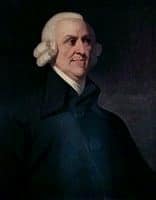
Yet people can’t be blamed for putting their own interests first. This is not selfishness, but acting responsibly! The miracle of free enterprise is this: People pursue their own interests by working hard to meet the needs and desires of others and by offering them what they need and want at a reasonable cost.
Economist Adam Smith (1723-1790) astutely put it this way: “By pursuing his own interest (the individual) frequently promotes that of the society more effectually than when he really intends to promote it. I have never known much good done by those who affected to trade for the public good.”
That’s the way it’s supposed to work; and not coincidentally, it’s the biblical way. Be careful! Don’t be misled by those who try to tell us that Smith and other advocates of free-market capitalism are promoting greed “because,” they tell us, “greed is embedded in the fabric of capitalism itself.” Of course capitalists can be greedy, but we need to understand that the free-market system does not encourage it. Instead, when it is allowed to operate as it should, capitalism promotes responsibility. In this informative 5-minute video from the Colson Center for Christian Worldview, Brooke McIntire explains.
Keep Reading!
In our next article we will explore clear biblical evidence that the free enterprise model of production and exchange of goods and services was indeed designed by God. I’ll release part 3 on Thursday, July 6.
Copyright © 2023 by B. Nathaniel Sullivan. All rights reserved.
- Part 1 of this series is available here.
Having ownership and control over tangible assets Is an expression of what it means to be human. Moreover, property rights also are essential to economic and personal freedom — types of freedom that also are at the heart of what it means to be human.
June 29, 2023 - Part 2 of this series — this page:
Who Has the Responsibility of Meeting the People’s Needs?
July 3, 2023 - Part 3 of this series is available here.
God’s Design Fosters Responsibility, Freedom, and Fulfillment
July 6, 2023 - Part 4 of this series is available here.
Work, Freedom, Rights, and Ethical Boundaries: Essential Elements of a Fair and Just Free Market
July 11, 2023
top image credit: Photo by Polina Rytova on Unsplash
This article is available for publication and distribution by Exposing enemies within the church, LLC.
Unless otherwise indicated, Scripture has been taken from the New King James Version®. Copyright © 1982 by Thomas Nelson, Inc. Used by permission. All rights reserved.

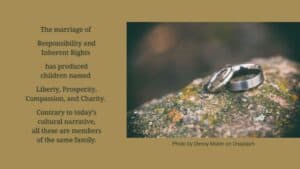
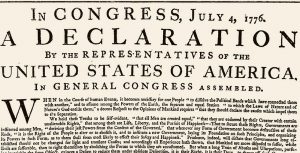
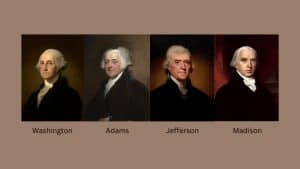
Be First to Comment